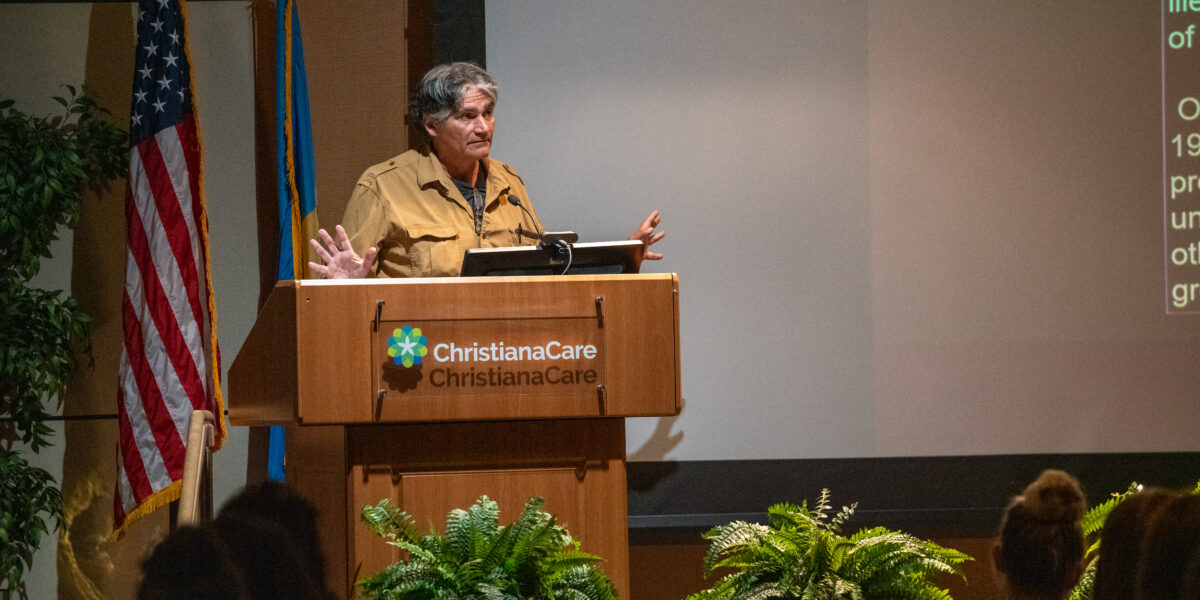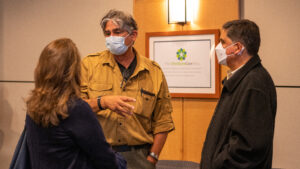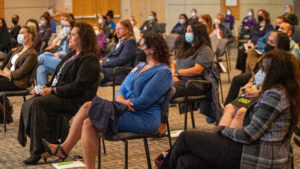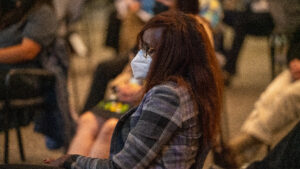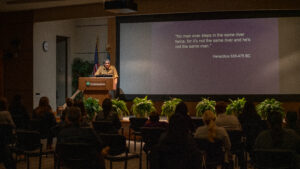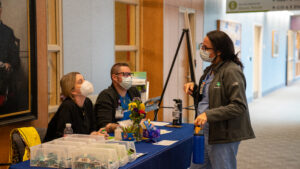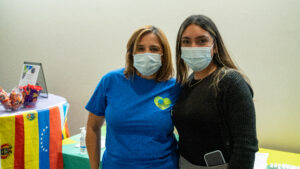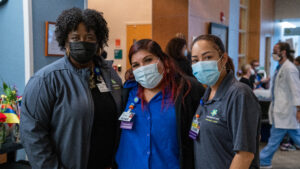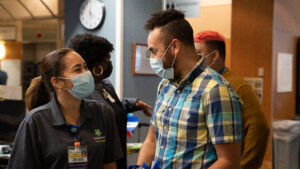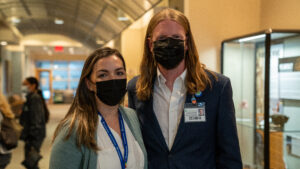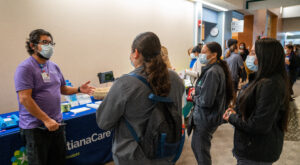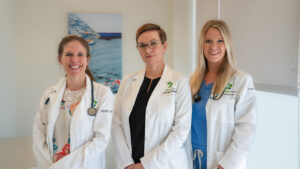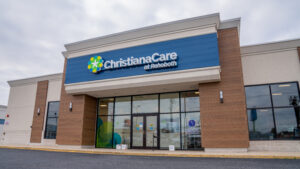Sixteen years ago, Steven Larson, M.D., and two other physicians opened the Puentes de Salud clinic in the basement of a church in South Philadelphia. Their mission was both simple and frustratingly complicated: to provide health care that others wouldn’t for the area’s underserved Latine community.
Over the years, the scope has expanded as the nonprofit organization has assumed a larger role in helping to address the complex needs of the community while building partnerships focused on health promotion, education and disease prevention. Today, there are more than 10,000 health care visits to Puentes de Salud.
More than a medical clinic, the immigrant health and wellness center also offers behavioral health, outreach and tutoring services for youth that focus on creating cultural connection, nurturing their creativity and exploring the world around them.
In his keynote address for ChristianaCare’s inaugural Health Equity Summit in October, Larson said he measures the success of the center through the lens of the people who benefit from its partnerships and culturally informed perspective.
“Putting six kids from this community into colleges here — to me, that’s a success right off the bat, knowing where they came from, where they’re going, and the overall value of education in the community,” he said.
Advocates and allies
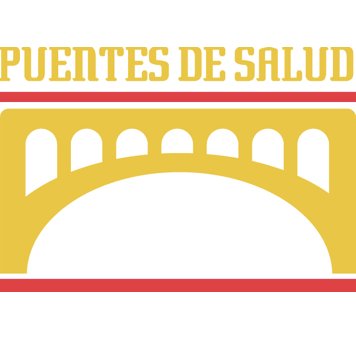 More than 50 caregivers sat in rapt attention in the John H. Ammon Medical Education Center as Larson shared his experiences building Puentes de Salud, which was the subject of the HBO documentary “Clinica De Migrantes.”
More than 50 caregivers sat in rapt attention in the John H. Ammon Medical Education Center as Larson shared his experiences building Puentes de Salud, which was the subject of the HBO documentary “Clinica De Migrantes.”
The summit was presented by the Office of Health Equity, which organized the event as a way for Latine caregivers and allies to learn from Larson and one another and also share what they are seeing across the health system.
“One of the most important things is for us, as members of this community and as advocates for health equity and allies to this community, to really form a network in which we can use relationships with one another to advocate for the patients that so much need access to quality health care,” said Jacqueline Ortiz, M. Phil., vice president for Health Equity and Cultural Competence for ChristianaCare.
She challenged participants to introduce themselves to at least two people they didn’t previously know before the event.
“Why? Because this will allow us all to be far more effective advocates for those patients.”
Connecting with the community
Years before founding Puentes de Salud, Larson was an emergency room physician who wanted to find a place where he could give back to the community.
He found it at Project Salud in Kennett Square, Pennsylvania, an area with a large migrant worker community but little access to health care. He appreciated the interdisciplinary nature of the nurse-managed practice model at Salud developed by nurse practitioner Peggy Harris, its founder.
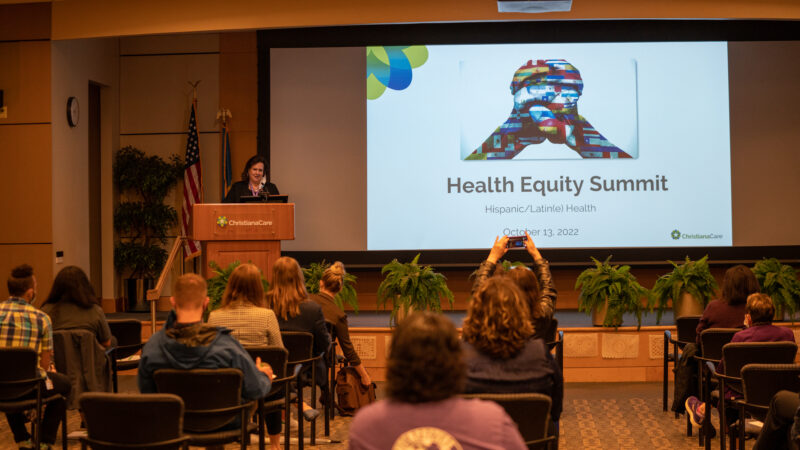
Working in a sparse, cramped space, the Salud team provided health care for Latine patients living in poverty with limited English proficiency and education and facing what Larson called cultural and linguistic isolation.
The experience prompted Larson and some colleagues to explore the needs of Philadelphia’s growing Latine community. Working with community leaders and other stakeholders, they asked about the challenges residents faced accessing care.
“Culturally centered practices are critically important to meeting the needs of our communities.”
— Rose, Kakoza, M.D., MPH
They heard about language barriers and the cost of medications and appointments for those without health insurance. But they also heard about transportation and child care issues and feeling culturally lost in their own neighborhoods.
“When you explore communities, you realize that people who grow up not accessing the health care system do that because it’s not available. When you develop that perspective, it helps you understand more about the people you care for. It’s a new way of thinking,” Larson said.
Seeking to understand
Cultural understanding and responsiveness are critical skills for health care providers to possess, Ortiz said.
Language barriers in a health setting, for example, make it impossible to provide patients with equitable care.
That’s why the work done by caregivers in Language Services and through the Language Interpreter Network of ChristianaCare matters so much. Fifteen interpreters work full or part-time for ChristianaCare, in addition to 93 LINCC interpreters who speak 18 languages.
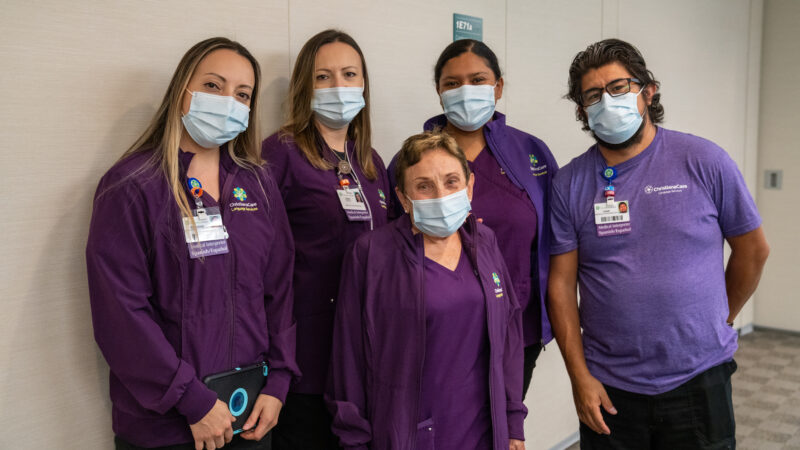
“I’ve been so lucky to be able to interpret for doctors who are not bilingual but have a big heart and really want to help my community,” said Claudia Angelica Reyes-Hull, M. Arch., manager of operations for Cultural Competence and Language Services at ChristianaCare.
“And I’ve listened to medical students that are learning about really culturally competent care for the Latino population, for immigrants.”
When providers seek to understand – and respect – a patient’s culture, ethnicity, sexual orientation, gender identity/expression or other identities, they are actively working to increase their partnership with patients and improve their health outcomes, Ortiz said.
Ortiz cited Martha Lopez, M.D., a second-year resident, as an example of how cultural understanding can make a difference. Lopez had a Spanish-speaking patient with a dangerously high A1C level. Lopez, who speaks Spanish, spoke with her patient, and found out she couldn’t afford the cost of her insulin.
She then reached out to Dawn Baker, Community Health program coordinator, to connect the patient with subsidies for her medications and worked to help her become more consistent in taking them. In a short amount of time, the patient’s A1C dropped significantly.
“With Dr. Lopez’s advocacy, this patient’s outcomes improved and she became more adherent with appointments and invested in caring for her health. She has that culturally concordant care,” Ortiz said. “That’s the kind of thing that we can do more of when our caregivers are connected.”
‘Keep pushing forward’
Some of the most important work takes place not in the provider’s office but in the community, where outreach coordinators and nurses use their connections to help patients navigate their medical and social needs, Ortiz said.
A staple in the community for years, the Helen F. Graham Cancer Center & Research Institute’s Community Health Outreach and Education program has helped people in Delaware schedule free or low-cost screenings, make healthy lifestyle choices and understand their own risk for the disease.
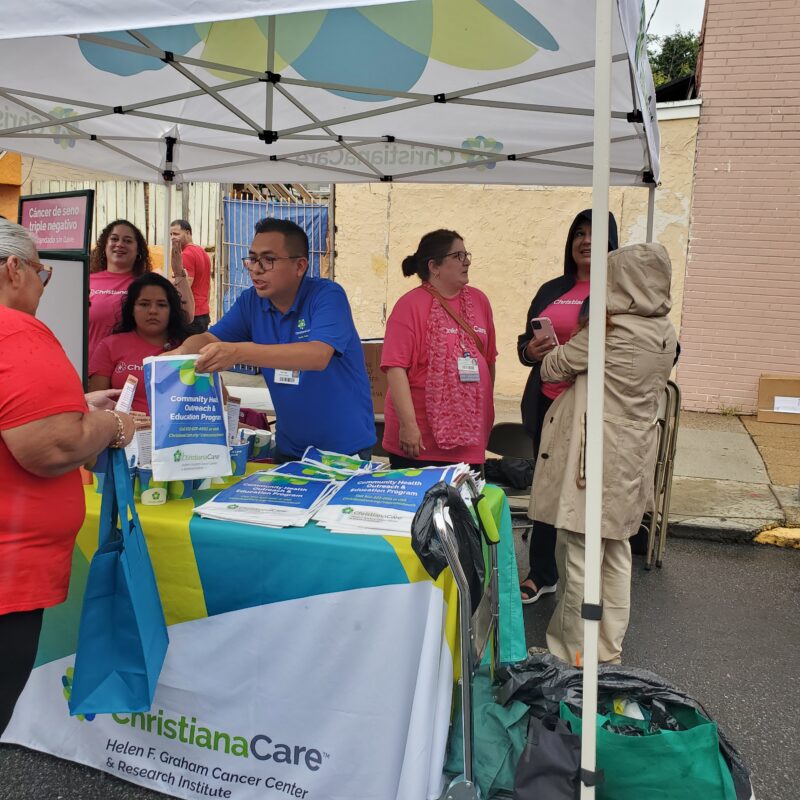
Led by manager Nora Katurakes, MSN, RN, OCN, the team of outreach workers are a familiar face in the community as they visit farmer’s markets, churches and other events to help build familiarity and trust.
Katurakes said these events are opportunities to break down barriers, such as through screenings and immunizations, and provide accessible patient education.
They also are helping to make a difference. Delaware’s cancer mortality rates, once the second highest in the nation 30 years ago, have dropped to 15th highest.
“We need to keep pushing forward,” Katurakes said. “We can’t be afraid to lead.”
‘A really special place’
In 2021, ChristianaCare added a new primary care and family medicine practice, Su Centro de Salud, with a unique focus — New Castle County’s Hispanic and Latine community.
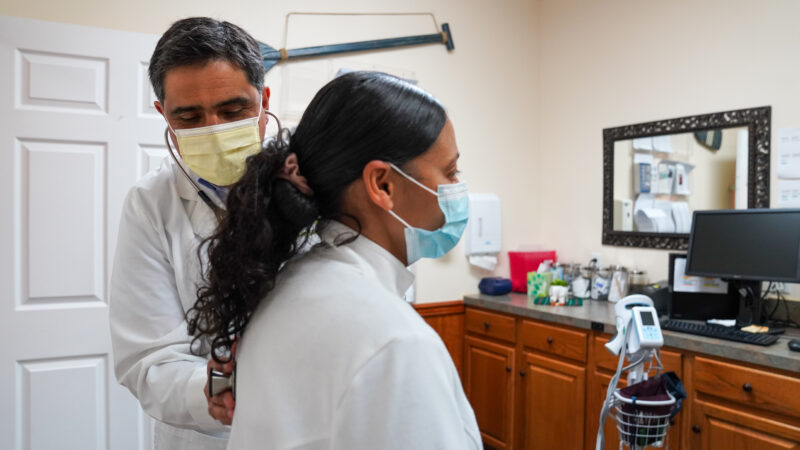
The practice, which serves more than 5,000 patients, features Spanish-speaking caregivers, culturally competent providers and staff. Exam rooms are intentionally large to accommodate families. Community health workers, health guides and behavioral health consultants work in the practice to provide additional assistance.
The practice is led by Carlos Reyes, M.D., a well-known provider in the Latine community.
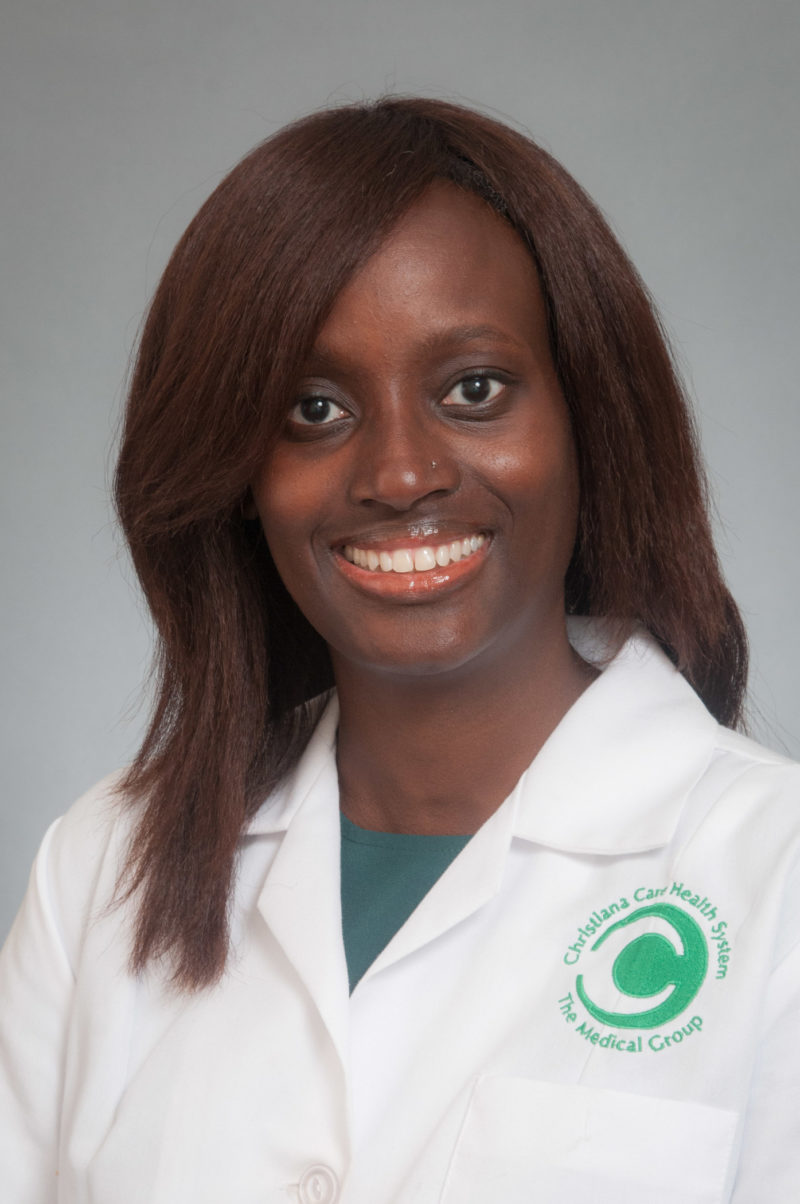
“It’s really a special place,” said Rose Kakoza, M.D., MPH, clinical director of Community Health & Equity for Primary Care and Community Medicine.
“And it’s an example of our broader health equity strategy. In primary care community medicine, we recognize that culturally centered practices are critically important to meeting the needs of our communities, particularly those experiencing disparities.
“And we’re committed to investing in practice models like Su Centro for other populations.”
Collaboration, communication, coordination — it’s all needed to truly serve a community, Larson said. He referenced ancient Greek philosopher Heraclitus, known for the proverb “no man ever steps in the same river twice,” to remind caregivers that reinvention is an ongoing part of patient care.
“We have to dismantle whatever thoughts we have about medicine in the past, and we have to be looking into the future because things change,” he said.
“We have to embrace that. You can’t go back in time.”
